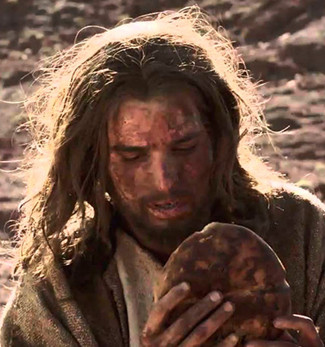The beginning of Christ's ministry on earth starts with an encounter between Jesus and Satan. First there is the promise of pleasure, the satisfaction of human hunger, then the offer of earthly power and wealth and finally the not-so-subtle challenge: Prove you are the Son of God.
Day in and day out we face these same choices. We are always being tempted to betray, to compromise, to prefer self to others, to prefer our desires over God's promise of Life in some form or other. And in so many ways, people or circumstances around us constantly challenge us to show them our God. He first reminds us that we are free. We then are confronted with empty promises of satisfaction, pleasure, wealth, and power to win our allegiance.
 According to the Gospel of Matthew, when Jesus returns from the desert he learns that John the Baptist has been arrested and put into prison. Jesus now continues to preach the message begun by John. But there was a big difference between the two.
According to the Gospel of Matthew, when Jesus returns from the desert he learns that John the Baptist has been arrested and put into prison. Jesus now continues to preach the message begun by John. But there was a big difference between the two.
John's preaching began with "Repent! The Kingdom of God is at hand." His was a call to repentance. It was a warning, a call to change our ways because something big and wonderful was soon coming.
The message of Jesus was and continues to be: "Rejoice! The Kingdom of God is here!" His was an invitation. This is a call to experience the presence of the Father in our every moment, our every breath, our every encounter. It is an invitation to enter into the Paschal Mystery of suffering, death and resurrection as deeply and as completely as He was about to.
The Paschal Mystery reminds us that God heals, He loves and He forgives. And when we feel Him close to us, His presence surrounds us, envelopes us and becomes part of us. Many of us struggle with our relationship to God. He is very often difficult to see, never answers us in terms that we would like, and never presents Himself in the concrete ways that we, as humans, could take as "visible signs." Most times, we dwell on our weaknesses and our failures or we try to pretend that God couldn't possibly love us in the way that we are told He does.
Yet, all of us have had moments in our lives when the presence of God is real. It could have been in the kindness of a stranger, the embrace of a child, a quiet moment alone or in the comforting words of a friend. And if we are open to it, the mystery of God overpowers the stench of sin and death, the ugliness of suffering and pain and the foul odor of hatred and violence. The Cross of Christ reminds us that God's arms are opened wide in a loving embrace, that He has smashed the rock of the Tomb and that He has given us a new life in Himself.
This is why the Season of Lent is so important. It is a preparation for Easter, yes. But it is so much more. Lent reminds us of our own temptations. It reminds us of our weakness, our sins, and our failures. It reminds of everything that tarnishes or warps Christ's image, whether in the individual or in the community.
More importantly, however, it reminds that God really doesn't care about these things. He only cares about us, and He loves us in spite of ourselves. Lent reminds us that our participation in the Paschal Mystery is not without suffering nor death, and that within our lived experiences, there is a sacred Presence and Love which constantly sustains us.
Lent does not begin with a story about us. It puts our focus on Jesus, as it should. Jesus, under severe temptation, stands out with strength and character. He kept his goals and priorities clearly in mind and made responsible life choices for how to achieve them.
Lent invites us to do the same. And there is opportunity here. We are also invited to keep our priorities in focus, to look clearly at our lives and the choices we make and to explore what they reveal about who we are and where we are going. It is a time to reclaim our true self, renew our sense of purpose, turn away from the path of least resistance and stop postponing our own growth towards maturity. Lent is truly a time to "repent," to change our hearts and to remember that, “We do not live on bread alone but on every word that comes forth from the mouth of God.”





